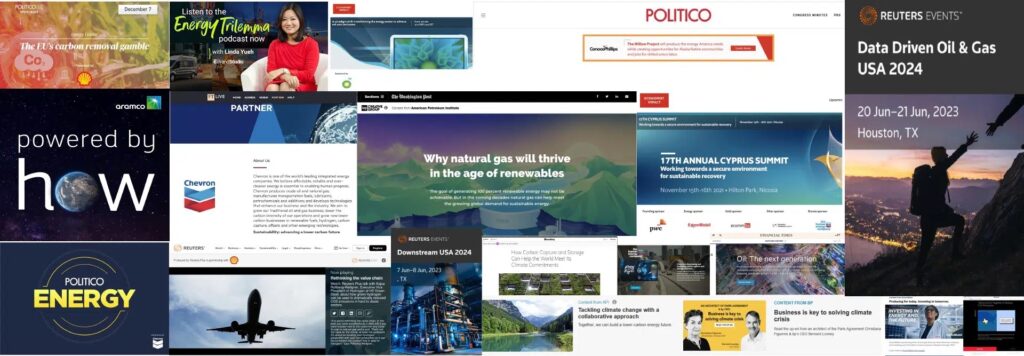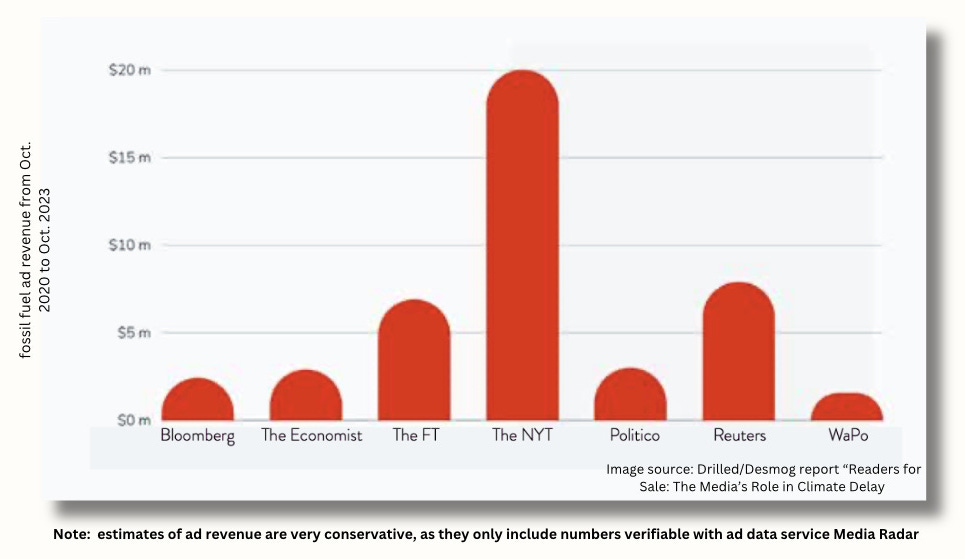‘Mad Men’: UN Chief Called for A Ban on Fossil Fuel Advertising – But Media Companies Remain Mostly Silent
6 Mins Read
In a speech last week, the UN secretary general implored countries and media companies to stop fossil fuel advertising – but is the warning falling on deaf ears?
“Climate change is the mother of all stealth taxes paid by everyday people and vulnerable countries and communities. Meanwhile, the Godfathers of climate chaos – the fossil fuel industry – rake in record profits and feast off trillions in taxpayer-funded subsidies.”
That was António Guterres, secretary general of the United Nations, addressing a gathering at New York City’s American Museum of Natural History last Wednesday. “Many in the fossil fuel industry have shamelessly greenwashed, even as they have sought to delay climate action – with lobbying, legal threats, and massive ad campaigns,” he said.
“They have been aided and abetted by advertising and PR companies. Mad Men – remember the TV series – fuelling the madness,” added Guterres. “Many governments restrict or prohibit advertising for products that harm human health, like tobacco. Some are now doing the same with fossil fuels,” he said.
His reference to the popular AMC show, where Manhattan ad executives made Lucky Strikes cigarettes a household name, builds on a warning he issued in September 2022, when he suggested that the ad and PR industry was harming its reputation by working for fossil fuel companies. An investigation earlier this year found that half of the executives at the six largest PR firms have links to the oil and gas sector.
Guterres’s speech came as he announced new data showing that there’s an 80% chance the world will breach its 1.5°C target, with temperatures in the past 12 months already reaching 1.63°C higher than pre-industrial levels. It was a strongly worded speech and most damning condemnation of the fossil fuel sector, which is the world’s worst source of pollution.
Yesterday, he doubled down on this stance by tweeting: “It is high time to put an effective price on carbon and tax the windfall profits of fossil fuel companies. This isn’t charity. It is enlightened self-interest.”
Only Politico and Google respond to Guterres’ speech

“I urge every country to ban advertising from fossil fuel companies. And I urge news media and tech companies to stop taking fossil-fuel advertising,” said Guterres.
Following the address, the Guardian contacted 11 major news outlets and tech firms that run fossil fuel ads. The response was, to say the least, underwhelming.
Nine out of the 11 companies didn’t get back to the Guardian, which itself banned fossil fuel ads in 2020. The only media outlet to respond was Politico, whose spokesperson said the publication “hosted a diverse array of advertisements”, including from fossil fuel companies, renewable energy producers, and climate advocacy groups.
Politico also aims to boost transparency. “Advertisers are prominently identified, and a clear distinction between news and ads, including sponsored content, is maintained across Politico’s platforms,” they said, adding that there was a strict division between the editorial and advertising departments. “No advertiser or advertisement sways editorial decisions or news judgment.”
The Washington Post, the New York Times, Reuters, Axios, Bloomberg, National Public Radio, CNN and MSNBC did not respond to the Guardian’s requests for comment. Nor did Meta, the parent company of Facebook and Instagram.
Google was the only other to respond – the tech giant had promised to prohibit ads that promote climate change denial in 2021, although it made $13.4M in ad revenue from such ads on YouTube between December 2022 and 2023.
“In creating our climate change denial policy and its parameters, we’ve consulted authoritative sources on the topic of climate science, including experts who have contributed to the United Nations Intergovernmental Panel on Climate Change Assessment Reports,” a spokesperson told the Guardian. They added that the policy “generally speaking… does not block specific types of advertisers on our platform”.
Fossil fuel industry deeply entrenched in the media landscape

Media and fossil fuel companies have been in cahoots with each other for a long time. During COP28, a joint investigation by DeSmog and Drilled revealed that the in-house ad agencies of leading trusted media houses – the New York Times, Politico, Bloomberg, Reuters, The Economist, the Financial Times, and the Washington Post – have been producing and promoting content for fossil fuel companies.
The New York Times, in fact, takes more money from fossil fuel ads than any other publication, raking in at least $20M between October 2020 and 2023. That’s in spite of a pledge to ban oil and gas companies from sponsoring its climate summit, climate newsletter, and The Daily podcast.
News website Semafor has also been criticised previously for taking money from Chevron. In December 2022, one climate journalist left the media outlet after it ran oil ads on his climate newsletter and articles. (At the time, Semafor said its ad policy was robust and followed industry standards).
Naomi Oreskes, a climate disinformation expert and professor at Harvard University, told the Guardian that media publications have a “core obligation to provide readers with good information”. This is because even if fossil fuel ads don’t influence the journalism, they can expose readers and viewers to misleading claims.
“There is also potentially a concern about the outlet’s editorial staff being exposed to the ads’ claims,” said Geoffrey Supran, an associate professor and scholar of fossil fuel industry messaging at the University of Miami.
We need to get off the ‘highway to climate hell’
I call on advertising & PR companies to stop acting as enablers to planetary destruction by working for the fossil fuel industry.
— António Guterres (@antonioguterres) June 6, 2024
Stop taking on new fossil fuel clients & set out plans to drop your existing ones.
They are poisoning our planet & they are toxic for your brand. pic.twitter.com/IWZiZubMOd
“The fossil-fuel industry’s advertising campaigns are state-of-the-art propaganda developed in partnership with public relations experts, executed via media outlets, and based on almost a century of collaborative experience,” added Supran.
“I call on these companies to stop acting as enablers to planetary destruction. Stop taking on new fossil fuel clients, from today, and set out plans to drop your existing ones,” Guterres said in his speech. “Fossil fuels are not only poisoning our planet – they’re toxic for your brand. Your sector is full of creative minds who are already mobilising around this cause. They are gravitating towards companies that are fighting for our planet – not trashing it.”
His speech followed the world’s largest elections in India, which were heavily influenced by climate change. And on Sunday, the EU began counting votes for its own elections too, with a centre-right coalition widely expected – it may not mean great news for the climate. But the crisis needs to be on the ballot this year, when half the world will be voting.
“There’s a 50-50 chance that the average temperature for the entire next five-year period will be 1.5°C higher than pre-industrial times,” he said. Experts are already sceptical that we’ll meet this target, with only 6% of the world’s top climate scientists believing so. “The truth is, the battle for 1.5°C will be won or lost in the 2020s – under the watch of leaders today. All depends on the decisions those leaders take – or fail to take – especially in the next 18 months. It’s climate crunch time.”
France has banned ads on some fossil fuel products, with Ireland and Canada discussing similar moves. Amsterdam became the first city to ban fossil fuel ads in 2020, and Edinburgh and Sheffield are set to follow. The UK has also banned ads from misleading environmental terminology as part of its efforts to curb greenwashing.
Oreskes pointed to the US’s ban on cigarette commercials on TV and radio in 1971, and how 60 other nations have completely banned tobacco ads. “It is well past time that we imposed similar restrictions on fossil-fuel ads,” she said, echoing Guterres.
“We are playing Russian roulette with our planet,” the UN secretary general added. “We need an exit ramp off the highway to climate hell.”



